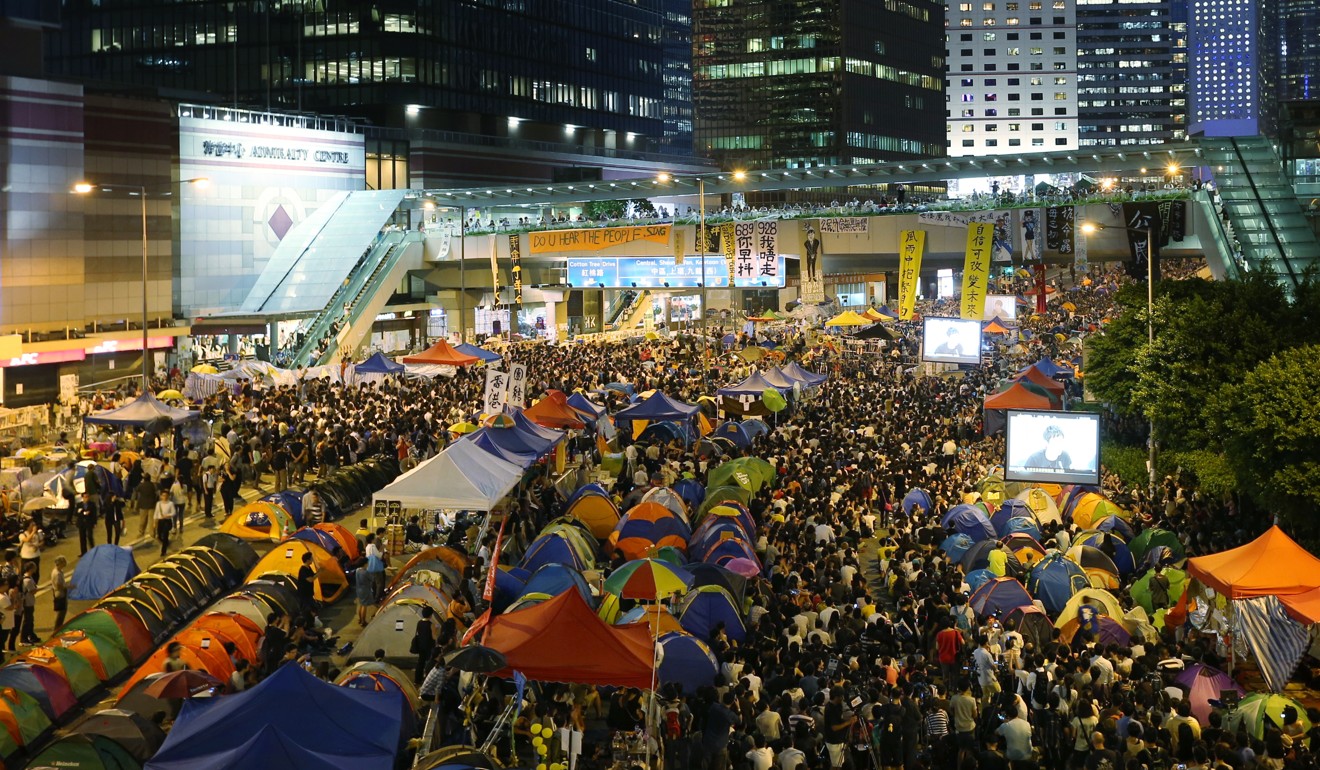
Prosecutors claim Occupy ringleaders spent a year planning protest that brought Hong Kong to a standstill
- Court shown videos of founders Benny Tai, Chan Kin-man and Reverend Chu Yiu-ming addressing students
- Trio are seen explaining what civil disobedience entails, while lawmaker Tanya Chan is seen rallying support for student protest
But, the city’s prosecutors said the snippets were evidence the group had incited the crowd for the 79-day protest, which they said was a “calculated” effort to force authorities to respond to their political demands.

In some of the clips, the nine defendants ask for protesters to call on others to come and support the movement in the days before it began on September 28, 2014. Other videos showed the three ringleaders hosting public forums.
Tai, 54, Chan, 59, and Chu, 74, have each denied three joint counts: one of conspiracy to cause public nuisance; one of inciting others to cause public nuisance; and one of inciting people to incite others to cause public nuisance.
The six others include legislators Tanya Chan, 47, and Shiu Ka-chun, 49, former student leaders Tommy Cheung Sau-yin, 24, and Eason Chung Yiu-wa, 26, and Raphael Wong Ho-ming, 30, vice-chairman of the League of Social Democrats, all of whom face – and have denied – the two incitement charges.
Former Democratic Party lawmaker Lee Wing-tat, 63, has denied one count of incitement to commit public nuisance.
Prosecutors have said the nine were responsible for the obstruction arising from the protests sparked by political reforms announced by Beijing in August 2014. The proposals had stopped short of granting Hong Kong open nominations in elections for the city’s leader, which the protesters had demanded.
The footage the prosecutors showed on Tuesday ranged from news clips to video footage shot by police officers on duty.
One focused on Tanya Chan, who on September 27, hours before the occupation commenced, took to a stage to mobilise a crowd outside the Government Central Office in Admiralty for a student-led protest.
Occupy leaders on trial: who they are and what they’re accused of
“Use your mobile phone, your phone or any means including the internet to tell people about it,” Chan said, urging the crowd to help boost the number.
She also instructed them to bring ponchos and external batteries for phone charging.
“Raise your hands. Do not throw any objects,” she told the crowd to remain peaceful through an amplifier, when she mistakenly thought officers from the police tactical unit were about to close in on them.
Chan Kin-man and Tai also spoke at the stage set up in the Tim Mei Avenue, which was to become the occupiers stronghold later. Both of them urged the crowd not to resort to violence.
Cheung told the crowd to invite their friends as it was the only way to convey their frustration to the government.
Prosecutors have claimed Chan Kin-man, Tai and Chu had been planning the protest for more than a year.
Some clips showed the trio hosting what prosectors called the first deliberation day of the campaign held at the University of Hong Kong on June 9, more than a year before the sit-in.
Tai was seen addressing a group of 800 people, telling them the movement had gone from “gestation period” to “organisational period”. He asked them to pitch in to help set the agenda, before taking questions from them. He was asked how the movement could gain credibility, and reach out to the public.
In the video, Chan Kin-man told the crowd what civil disobedience meant, while Chu pledged to lend support to Chan and Tai, who he called two “young academics”.
“I am willing to stand beside everyone, so as to ensure universal suffrage will be implemented in 2017,” Chu said.
Hong Kong leader rejects British MPs’ criticism as democracy leaders go on trial
The court’s video screens then cut to another gathering in July, 2013, featuring the trio, Shiu and – again – Tanya Chan. They stood in front of a backdrop emblazoned “Determination by People. Universal suffrage now. Occupy Central. Poised to start anytime”.
“The power of love and peace is strong. It can penetrate the armour of a tank,” Tai said, invoking the full name of the campaign “Occupy Central With Love And Peace”.
Shiu told the crowd to hand themselves in if they were arrested, and to file no defence as part of the civil disobedience movement.
The trial continues before Judge Johnny Chan Jong-herng.

